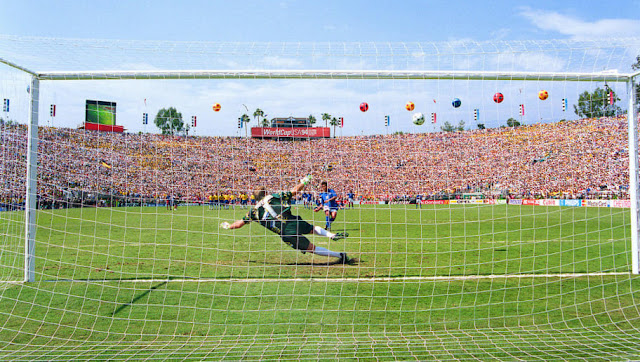33 MARNED Tejada
Alberto Tejada Noriega was appointed for a very important game - with a win, Morocco would have dragged the Netherlands out of the competition with them. It was a distinct possibility too, for the third game running, Morocco played better than their opponents, but for the third straight time they were defeated, 1-2 this time.
Tejada from Peru was in charge of his second game, after doing a decent job in the early Cameroon - Sweden match. He stood out, as he did in this game, for his demonstrative leadership style. And yet, despite that, despite his very rigorous disciplinary control, he actually succeeded in this game. With a second group stage appointment to an important game and attending a knockout game as fourth official, Tejada can reflect on fair treatment by FIFA at this tournament.
Analysis
=> Tejada operated a very rigorous disciplinary control. He opened the cards with one for dissent with a player (quite justifiably) angry that he hadn't awarded him a freekick on the edge of the penalty area. Three mandatory cautions for further fouls by Morocco players were correctly given, and after less than half-an-hour the score for four-nil in bookings.
Referee then made an interesting choice - a balancing yellow for a tactical charging foul which isolatedly one would imagine that most referees at World Cup 1994 would have punished with a freekick only. The gamble worked, it calmed both the Morocco players and the wider game down.
Then the dissent at 41' I would argue is really interesting. Again, if I were Mohamed Samadi, I'd be pretty miffed with the decision to punish me in that duel towards the edge of the penalty area. He makes a dissenting gesture of the more flagrant variety. Tejada books him and very clearly (and flamboyantly) gesticulates in a partly apologetic manner "if you dissent with those gestures I have to book you". The old policeman's trick! I think the rules are bulls**t too, but I have to follow them. And it worked!
So he could operate a disciplinary control that was both predictable and smart.
=> To follow from the point above, I found it quite fascinating how Tejada operated with gestures befitting of a dictator on the pitch, as well as gaining the players empathy. 41' was a microcosm of how he handled the rest of the game. They accepted his presence and mostly sound decisions as a force for good on the pitch.
=> Tejada was not perfect though. He made some clear mistakes in the goings-on of the game, and showed some deficiencies in managing the game (why not stop play for the kick at 25' and then avoid the frustrated foul afterwards; some doubtful last touch calls) and the players (in another (knockout) game the players would simply have rejected this style). He could never really calm the game down with his style, the players only really tolerated it, not more.
Mikael Everstig made a very important mistake at 8'. Venancio Zàrate's flag denied Morocco what would have been a penalty at 65' - he correctly played the onside from all the players in shot, but it is impossible to be sure that the Netherlands player running from below wasn't playing the attacker onside (though my feeling is not). To be supported.



Tejada's don't mess with me or get booked style, i like it:-)
ReplyDeleteAn interesting performance in a match that was quite close. His strict disciplinary line was remarkable and all the cards given were quite correct (30' was clearly a soft balancing call), even if some of his foul decisions were debatable. His style is indeed of the "works or blows up" variety it seems, but here it did. Opening caution should have been for the heavy tackle early on though.
ReplyDelete